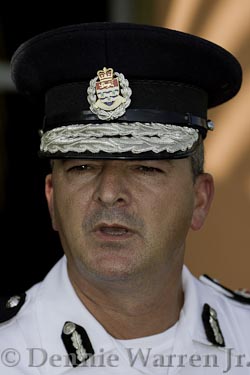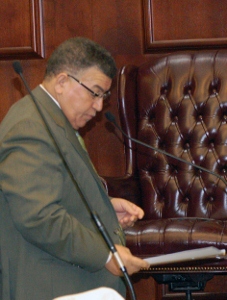Archive for August, 2012

$8M missing in vehicle fees
 (CNS): The police commissioner said he believed there was as much as $8 million missing from the public purse in connection with uncollected fees from unlicensed vehicles on the road. David Baines told Finance Committee members last week that now the RCIPS had recruited a significant number of staff to take it beyond just a response capability, he had officers that he could now deploy in proactive work with the DVL staff to begin to address that problem. These high visibility operations had, he said, already boosted numbers at vehicle licensing. He also explained that while the stand-alone traffic department has been merged into normal response, specially trained officers were still working in the RCIPS.
(CNS): The police commissioner said he believed there was as much as $8 million missing from the public purse in connection with uncollected fees from unlicensed vehicles on the road. David Baines told Finance Committee members last week that now the RCIPS had recruited a significant number of staff to take it beyond just a response capability, he had officers that he could now deploy in proactive work with the DVL staff to begin to address that problem. These high visibility operations had, he said, already boosted numbers at vehicle licensing. He also explained that while the stand-alone traffic department has been merged into normal response, specially trained officers were still working in the RCIPS.
Answering the usual questions from MLAs about the almost $33 million allocation in this year’s budget to the police service, the commissioner spoke about how officers were deployed. He said that prevention was an important part local policing and there was a strategy in place in which the police patrolled and targetedvulnerable and at-risk areas as well as monitoring known offenders. He said that improvements in security in the face of increasing armed robberies would often see offenders changing their actions in response to increased preventative methods employed by business owners as well as police surveillance.
Despite the increase in the police budget, which was mostly down to the boost in numbers throughout the service, the commissioner pointed to cost cutting measures in the service through better management of police marine vessels on patrol and cutting fuel use. He said that the marine fleet had never been as well maintained and ready for use as at present, with just one boat undergoing some minor maintenance.
Although the police helicopter had been under threat of being sold off under a previous budget proposal, there were no specific questions about it being sold from Finance Committee members. Baines told MLAs that the helicopter was capable of flying as far as the US and had been staffed with first responders so it could be used in medical emergencies as well as police matters
The commissioner explained some of the recent changes to the RCIPS and said the Drug Task Force was now part of the Serious Crime and Drugs Task Force, which reflected the changing threat of serious criminality the islands faced recently.
The number of neighbourhood officers was increasing and was up to eleven dedicated officers, Baines said, noting that it was always a battle for the RCIPS to facilitate the advancement, development and specialist training of officers while at the same time filling the neighbourhood beat officer posts.

Bush dismisses under funding of legal aid
 CNS): With an increase in cases covered by legal aid, the constant under-funding of the programme has led to the courts having to cover the shortfall from the following year’s budget, presenting the judicial administration with a mounting financial problem. The court administrator, Kevin McCormack, told Finance Committee on Friday evening that the cost of supplying legal aid was consistently around $1.8 million but the budget allocation for this year was still some $200,000 below the money required, even though the appropriation for 2012/13 was higher than the $1.2 million the courts received for legal aid in 2011/12.
CNS): With an increase in cases covered by legal aid, the constant under-funding of the programme has led to the courts having to cover the shortfall from the following year’s budget, presenting the judicial administration with a mounting financial problem. The court administrator, Kevin McCormack, told Finance Committee on Friday evening that the cost of supplying legal aid was consistently around $1.8 million but the budget allocation for this year was still some $200,000 below the money required, even though the appropriation for 2012/13 was higher than the $1.2 million the courts received for legal aid in 2011/12.
“The dilemma for the judicial administration is that we have had to pay some bills that arise from last year out of the money provide for this and clearly that is an unsatisfactory state of affairs,” McCormack told the members of the committee in response to questions about the allocation. The court administrator pointed out that the serious criminal cases before the court were increasing but the budget was not.
However, the premier, in his capacity as chair of Finance Committee, said that everyone had to face cuts. “I am sure all of us recognise that there are cuts,” McKeeva Bush told McCormack. “In fact your salary is less this year than it was last. I think all of us understand what happened.”
In the first six month of this year there were already 70 indictments filed in the courts which, compared to 109 in 2010 and 118 in 2011, suggests that the court may even struggle to keep the legal aid bill within the average $1.8 million, never mind the $1.6 million it has actually received.
McCormack explained the current legal aid system and the application process to the committee which, he said, were rather “sketchy” and did not give the courts the power to closely examine the claims made by people applying for legal aid and their ability to contribute to their representation. However, he said, the courts do make an effort to try and establish the accuracy of the information supplied by the applicant.
The legal aid issue continues to be a particularly controversial one because of the lack of public support for a publicly funded defence for those charged with serious crime. However, those facing the most serious criminal charges, such as murder, robbery and other violent offences, are often the least likely to be able to afford a lawyer and cannot be tried without one.
Over the last few years efforts have been made to try and cut the funding rather than increase it and the premier, whohas made clear on a number of occasions his opposition to legal aid being given to those who are facing serious criminal charges, had attempted to remove the control of legal aid funding from the chief justice and the courts and sought to place the funding in his own ministry as he examined the idea of establishing an independent legal aid clinic.
However, under pressure from the previous governor and following various reports, the budget was returned to the courts.
There are no more than a dozen local criminal attorneys that do regular legal aid work. Compared to the usual rates for lawyers in Cayman, the legal aid rate at $135 per hour is not particularly attractive. That rate, however, is paid to all criminal defence attorneys representing defendants on legal aid, including the QCs drafted in from the UK or around the region for the more serious criminal trials.
The latest effort to address the lack of funding for legal aid has also met with considerable controversy. The draft Legal Aid and Pro Bono Legal Services Bill 2012, which was circulated by the authorities in May, proposes to make it mandatory for all lawyers practicing in the Cayman Islands to undertake 25 hours per year of pro-bono services or pay an additional annual fee of $2,500.
Members of the Criminal Defence Bar Association (CDBA) described the proposal as an unjustified attack on lawyers doing legal aid work and warned that having unqualified and uninsured lawyers from across the legal profession doing pro bono work representing people charged with crimes could present significant human rights problems.
Related articles:
Bill attacks criminal lawyers (June 2012)
Lawyers to work free (May 2012)
Information boss to rule on withheld legal aid report (May 2011)
Jack stops Mac legal aid plan (December 2009)
Mac changes legal aid policy (October 2009)
Mac defends legal aid cut (October 2009)

Courts idle despite bottleneck of criminal cases
(CNS): Although criminal trials are backed up into the middle of next year, two Grand Court rooms remained empty this week after scheduled trials for serious offences failed to go ahead. In one trial, as reported earlier this week by CNS, the lead police officer in the case against Robert Crawford for possession of an unlicensed firearm notified the parties at the eleventh hour that she would not be on the island, forcing an adjournment to October; and in the second case the crown revealed on Monday morning that it would not be proceeding with its case against Kurt Carter, who was also accused of possession of an unlicensed firearm.
Peter Polack, a local attorney who has been outspoken about the inefficiencies of both the Office of the Director of Public Prosecutions (DPP) and the RCIPS in the past, described the situation this week as “an incredible waste of precious court resources”, with the criminal courts at a standstill for an entire week.
“Two Grand Court judges now sit idle in an atmosphere where congestion in the Grand Courts has peaked, thanks to the AG’s grand idea to move the Summary Court bottlenecks to the Grand Court by removing the preliminary inquiry,” Polack said, noting that the changes introduced by the attorney general were made with out the necessary support of the long overdue new Grand Court building, additional Grand Court judges or a streamlined and efficient DPP or RCIPS. "Grand Court trials are now being set next year due to the backlog of matters,” he said.
Carter’s case is another in a long line of firearms offences over the last few years that have gone through the courts only to be dropped owing to a lack of evidence. In many cases this is down to crown witnesses refusing to testify once the matter reaches the courts, as was the case on Monday.
The 22-year-old was arrested following an incident on Hirst Road in Savannah in January when Sean Dunbar was reportedly shot. Charged with attempted murder and possession of an unlicensed firearm, the charge was later reduced to unlawful wounding. However, without the complainant the crown’s case fell apart.
With no back-up trial scheduled, both Court Five and Court One, where Crawford should have been facing trial, were left quiet this week.
Related article:
Cayman yacht party stirs up controversy for Romney
(CNS): As Republican candidate Mitt Romney's investments in the Cayman Islands continue to star in the US presidential election campaign, the international media focused on a Republican Party campaign bash toasting top donors yesterday on a 150-foot yacht flying the Cayman flag. Romney was on board at the floating party hosted by Florida developer, Gary Morse, on his yacht Cracker Bay. The event, attended by around 50 people along with Romney relatives, appeared on no public calendars, according to ABC’s news reporter Brian Ross. "It was a really nice event. These are good supporters," billionaire Wilbur Ross, an energy industry executive told the US news channel.
Romney's Cayman-based investments have come under fire during the campaign as they have enabled him to pay much lower taxes than middle income Americans.
The Cayman flag flies on many vessels around the world but the US media was quick to point out that by registering his yacht in the Cayman Islands, Morse does not have to pay any taxes on his luxury vessel, which is said to seat 30 for dinner and has an extensive art collection.
The Cayman flag flies on many luxury, and not so luxury, vessels around the world, as a result of the on-going success of the Maritime Authority of the Cayman Islands (MACI).
The Cayman registry boasts modern maritime legislation and an experienced global team. There are 1,985 boats registered in the Cayman Islands from merchant ships to super-yachts.
Related articles:
Cayman struggles in the middle of candidates' battle

Lightning does strike twice in Bodden Town
 (CNS): A local dive instructor has defied some of the highest odds when it comes to natural phenomena after his home was struck by lightning twice in the same week, the local television news channel reports. While lightning does strike twice, it doesn’t do it very often as the odds of it happening are said to be 360 billion to one, but with Cayman experiencing a significant number of electrical storms, Des Duffield ‘beat’ those odds. He told Cayman27 he could not believe his home was hit twice in seven days. Duffield had just replaced his electrical equipment damaged in the first strike last week when he was hit for the second time on Monday in the latest electrical storm.
(CNS): A local dive instructor has defied some of the highest odds when it comes to natural phenomena after his home was struck by lightning twice in the same week, the local television news channel reports. While lightning does strike twice, it doesn’t do it very often as the odds of it happening are said to be 360 billion to one, but with Cayman experiencing a significant number of electrical storms, Des Duffield ‘beat’ those odds. He told Cayman27 he could not believe his home was hit twice in seven days. Duffield had just replaced his electrical equipment damaged in the first strike last week when he was hit for the second time on Monday in the latest electrical storm.
The Bodden Town resident said he was watching the light show, which was beautiful, when the second bolt hit his home and blew out all his appliances all over again.

Budget passes through LA
 (CNS): The government has finally completed the long-awaited and most controversial budget in the country’s history after legislators completed Finance Committee in a matter of days and voted on the 2012/13 Appropriations Bill. The governor or the acting governor must assent to the bill before the end of business on Friday in order for the government to be able to function after that date, however, since the UK has offered its conditional approval to the spending plans, it is expected to be signed. With government now hoping to raise some $650 million over the next nine months, legislative changes will be required quickly to enable government to collect the new fees.
(CNS): The government has finally completed the long-awaited and most controversial budget in the country’s history after legislators completed Finance Committee in a matter of days and voted on the 2012/13 Appropriations Bill. The governor or the acting governor must assent to the bill before the end of business on Friday in order for the government to be able to function after that date, however, since the UK has offered its conditional approval to the spending plans, it is expected to be signed. With government now hoping to raise some $650 million over the next nine months, legislative changes will be required quickly to enable government to collect the new fees.
Following the vote, Ezzard Miller, the independent member for North Side, said he was still sceptical that government could collect the targeted revenue.
“I do not believe there is any way in the current circumstances for government to collect $650 million from the economy,” Miller said. “What happens when the economic advisor makes his trips back to the Cayman Islands and finds that the revenue and spending is not on track?” he asked, pointing out that, with no room for supplementary appropriations under the conditions imposed by the UK, the government could find itself in real difficulties.
The independent MLA said that the requirements imposed by the UK would tie the hands of all future governments because of the incompetence of the UDP government and its failure to fulfill the promises it had made to the UK over the last three years when it came to cutting spending and producing balanced budgets.
The Foreign and Commonwealth Office (FCO) was not necessarily being unreasonable, Miller added, noting that the original three year plan which the government failed to follow was established by this administration and not the UK.
“This was the government’s plan, not the FCOs, and it was government which failed to do the right thing,” the MLA added, pointing to the continued increases in spending year on year including even this year. While the UDP administration is claiming significant cuts, Miller noted that government spending has increased by more than $30 million.
The premier revealed in his statement this week that the Public Management and Finance Law (PMFL) and the Public Service Management Law (PSML) would be amended to re-centralize the financial and human resources functions of government to cut costs.
This should have been done more than two years ago, Miller said, noting that his motion on this issue was rejected by government on the grounds that it was already in the process of amending the relevant legislation.

Finger biter escapes jail after guilty plea
(CNS): A woman who bit off the end of her friend’s small finger during a drunken fight was handed a 12 month suspended sentence for one year and ordered to pay over $1,200 in medical costs. in court Tuesday, KerryAnn Jackson admitted biting off the top of the victim’s little finger and pleaded guilty to unlawful wounding but denied the original charge of wounding with the intent to do grievous bodily harm as she said she had never intended to harm anyone. Jackson said the injury was a result of carelessness in a fight. The altercation occurred, the court heard, after Jackson’s friend tried to prevent her from driving home while drunk.
Jackson caused the injury when she fought with the victim following a night out drinking at a club with her friends. One of the women had sought to dissuade Jackson not to drive home but the defendant, who was said to be inebriated, insisted. As the complainant took the keys from her friend and tried to reason with her not to drive, the words became heated and eventually turned into a physical fight. At some point in the fight the victim felt a stinging sensation and looked to see the top of her smallest finger was missing down to the joint. The court heard that Jackson, wearing a contorted expression on her face, then spat the piece of her friend’s finger on the ground.
The victim was rushed to hospital where the skin and the remaining finger was grafted but the top could not be saved. Although the injury was said to have healed, the joint is missing.
When handing down the sentence Justice Carol Beswick said that Jackson was of previous good character and the injury was caused by a single bite and not a sustained attack. As a result of her actions, the judge said, the defendant had also already suffered as she has lost her friendship with the victim and others involved who had all been very close, she has acquired a criminal record preventing her from travelling, in particular to the US, and although employed at a local bank the conviction has reduced her employment opportunities.
The judge noted, however, that she had to consider the position of the victim and her pain and suffering. She ordered that Jackson pay her former friends medical costs of $1205.09 and place the defendant on a curfew during the period of the suspended sentence on Friday, Saturday and Sundays between 9pm and 6am. She also barred Jackson from drinking in a public place throughout the twelve months.
In accordance with the sentencing guidelines, the circumstances of the offence and local precedents, the judge said the starting point after a trial would have been a suspended sentence of 18 months for two years but discounted the periods to 12 months after Jackson’s plea.

Carelessness fuels burglaries
 (CNS): Although year on year burglaries on Grand Cayman are falling, the crime still remains a significant problem in Cayman and in many cases the carelessness of home and business owners is encouraging opportunism, a senior police officer has said. By 31 July this year there were 20 less burglaries recorded than last year, with 293 incidents compared to 313 in 2011. Police also boast a good detection rate, having brought charges in almost 58% of the cases reported last year. Although police are playing their part, Detective Superintendent Marlon Bodden from CID said owners must take steps to ensure their property is secure as there are still many occasions where windows and doors were unlocked when a burglary took place.
(CNS): Although year on year burglaries on Grand Cayman are falling, the crime still remains a significant problem in Cayman and in many cases the carelessness of home and business owners is encouraging opportunism, a senior police officer has said. By 31 July this year there were 20 less burglaries recorded than last year, with 293 incidents compared to 313 in 2011. Police also boast a good detection rate, having brought charges in almost 58% of the cases reported last year. Although police are playing their part, Detective Superintendent Marlon Bodden from CID said owners must take steps to ensure their property is secure as there are still many occasions where windows and doors were unlocked when a burglary took place.
Encouraged by the fall in the crime and the high detection rates, Bodden said the police still appreciate the impact burglary has on the community at large. As a result, the RCIPS remains focused on tackling the problem with a multi-faceted approach which calls for prevention on the part of the community as well as the police.
He explained that officers are patrolling both in the open and covertly and focusing particularly on areas with the highest number of break-ins, such as the seaside of Seven Mile Beach where 55 burglaries have occurred so far this year, with a further 8 on the land side and Prospect with 18 reported incidents. He said there were 24 incidents reported in the Walkers Road area.
However, Bodden said it was “often like squeezing a balloon” — police increase visibility in one neighbourhood the burglaries pop up elsewhere. He said that while there were numbers of motivated offenders, the majority of property crimes result from opportunism fuelled by the carelessness of owners.
Bodden said he wanted the community to know that the RCIPS takes burglary seriously as it has a wide impact. When business owners become victims of crimes, he said, it affects them in different ways, not just economically, but emotionally and physically. The senior officer said that when they are repeatedly hit they become disillusioned about carrying on in business and that has a wider impact on people’s jobs and the entire economy, so the police are doing all they can to try and minimize the crime.
While the police are monitoring and charging suspects and chasing up routes where stolen goods are fenced, as well as patrolling the streets, he said, the public has also played its part in assisting with investigations and information.
However, he said, the issue of security was essential to reducing burglaries and their impact. Bodden spoke of the effectiveness of quality CCTV, alarms and other sophisticated security measures but reminded people about common sense things like good lighting, which is a deterrent in its own right but also necessary to help produce good CCTV footage. He remninded home and business owners to ensure that obstacles to visibility, such as overgrown trees and bushes, are trimmed and said that people should lock doors on windows on their properties.
Neighbours also have their part to play in keeping a look-out for each other. Bodden noted that when criminals break in to homes in a condo complex they often hit more than one property. One vulnerable condo can attract an opportunist burglar, who will then hit several apartments at the same time.
Bodden pointed to the work police do in cooperating with other agencies, such as customs, immigration, planning and the department of labour. He said the police try to help the suspects and steer them away from a life of crime but they pursue the prosecution of offenders.
With the range of goods being stolen increasingly diverse, the theft of food and toiletry items as well as more common things such as electrical goods, cash and jewellery, reflects the current state of the economy. Bodden emphasised, however, that while economic hardshipmay be one of the causes of crime, burglary is still illegal.

Deputy governor creates new civil service gongs
 (CNS): In the wake of revelations that there are significant plans afoot to reduce the numbers of Cayman’s civil servants, the deputy governor said Wednesday that he is committed to building a new sense of morale throughout the public service and believed the new DeputyGovernor’s Awards will help. Franz Manderson said the service was informed about the awards this week which highlight the outstanding efforts of civil servants across core government so that both the people and their actions can inspire their peers. The awards set high standards, which are expected from all Cayman Islands civil servants.
(CNS): In the wake of revelations that there are significant plans afoot to reduce the numbers of Cayman’s civil servants, the deputy governor said Wednesday that he is committed to building a new sense of morale throughout the public service and believed the new DeputyGovernor’s Awards will help. Franz Manderson said the service was informed about the awards this week which highlight the outstanding efforts of civil servants across core government so that both the people and their actions can inspire their peers. The awards set high standards, which are expected from all Cayman Islands civil servants.
“The Deputy Governor’s Awards are designed to recognize the excellent work performed by civil servants in the area of customer service, and towards reaching the goals of their respective departments,” he added. The accolades are an internal rewards scheme for civil servants who will be participating within their departments on a monthly basis.
“Every day civil servants go about exceeding the expectations of their customers, and it is important that such excellence is recognized,” said the deputy governor. “I look forward to the launch of this exciting new programme and would like to take this opportunity to encourage all of my fellow civil servants to continue to strive for excellence in service.”
In the light of the government’s fiscal problems and pressure from the UK to reduce borrowing and return to the principles of prudent financial management as set out in the Public Management and Finance Law, the public sector is beginning a process of retraction over the next five years which will see a significant number jobs shaved from core government.
In a statement issued to the media on Tuesday evening the premier said that the civil service would not fill 80% of the posts that were originally budgeted in the 2012/13 and there would be a continuation of strict hiring moratorium in future years. He revealed that there would be a reduction in headcount of the civil service by 360 over the next 5 years, a pay freeze on civil service salaries and the implementation of a voluntary separation scheme – meaning redundancies.
All new civil servants will have a revised health plan where they will co-pay and new police officers will face a revised housing allowance.

Pool death witnesses wanted
 (CNS): Updated Wednesday 4:30pm — Although the police do not suspect foul play in the death of a 39-year-old George Town resident, found dead in a pool at Treasure Island on Monday night, they are appealing for witnesses. Officers are investigating the circumstances surrounding the death of Vicente Ruben Inga Sinchi, from Ecuador, on behalf of the coroner, and are appealing to anyone who may have seen or spoken to the deceased that night to come forward. Enquiries have revealed that on the night of Monday, 27 August, he had been drinking at The Billy Bones Bar located at Treasure Island. Sometime just before midnight, it would appear he entered the swimming pool and was found about ten minutes later at the bottom of the pool.
(CNS): Updated Wednesday 4:30pm — Although the police do not suspect foul play in the death of a 39-year-old George Town resident, found dead in a pool at Treasure Island on Monday night, they are appealing for witnesses. Officers are investigating the circumstances surrounding the death of Vicente Ruben Inga Sinchi, from Ecuador, on behalf of the coroner, and are appealing to anyone who may have seen or spoken to the deceased that night to come forward. Enquiries have revealed that on the night of Monday, 27 August, he had been drinking at The Billy Bones Bar located at Treasure Island. Sometime just before midnight, it would appear he entered the swimming pool and was found about ten minutes later at the bottom of the pool.
His family in Ecuador has been informed and police have confirmed that there would appear to be no suspicious circumstances surrounding his death. Sinchi was described as 5’4’’ in height, medium build, black hair and was wearing green checked shorts and a green t-shirt on the night he died.
Officers are appealing to anyone who may have seen or spoken to the deceased that night to contact Detective Sergeant Charmaine Huntley on 949-4222.
Meanwhile, police also confirmed that there are no suspicious circumstances surrounding the death of a 46-year-old woman whose body was found outside her home in Patrick’s Avenue last Monday. An RCIPS spokesperson was unable to given any details on how the woman had died, whether it was natural causes or an accident, but the police said a post-mortem took place Thursday 23 August and they were satisfied that there were no suspicious circumstances.